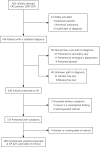Potential for Reducing Time to Referral for Colorectal Cancer Patients in Primary Care
- PMID: 31501203
- PMCID: PMC7032917
- DOI: 10.1370/afm.2446
Potential for Reducing Time to Referral for Colorectal Cancer Patients in Primary Care
Abstract
Purpose: An optimal diagnostic process in primary care is pivotal for reducing cancer-related disease burden. This study aims to explore reasons for long times to referral for Dutch colorectal cancer (CRC) patients in primary care.
Methods: A retrospective cohort study of anonymized free-text primary care records from the Julius General Practitioners' Network database, linked to the Netherlands Cancer Registry. Patients with a confirmed CRC diagnosis from 2007 through 2011 that symptomatically presented in primary care were included. Median time and interquartile ranges from presentation in primary care to referral were calculated for multiple patient and presentation characteristics. Associations of these characteristics with long time to referral (75th percentile was ≥59 days) were examined with log-binomial regression analyses. Routes to referral of patients with the longest times to referral were explored using thematic free-text analyses (90th percentile at ≥219 days).
Results: Among the 309 people with CRC, patients who were female, did not have a registered family history, had a history of malignancy, lacked alarm symptoms at presentation, or had hemorrhoids at physical examination were at risk for longer time to referral in univariable analyses (longer median durations and/or univariable association with the 75th percentile). Only presentation without alarm symptoms showed a statistically significant association with long duration (75th percentile) in multivariable analysis (relative risk = 1.7; 95% CI, 1.1-2.6). Thematic exploration of the diagnostic routes to referral of patients with the longest durations (90th percentile) showed 2 dominating themes: "alternative working diagnosis" and "suboptimal diagnostic strategies," and included the sub-themes "omitting to reconsider an initial diagnosis" and "lacking follow-up."
Conclusions: Long time to referral for CRC in primary care is mainly related to low cancer suspicion. There is potential for reducing the longest times to referral for patients with CRC in primary care, with earlier reconsideration of the initial hypothesis and implementation of strict follow-up consultations.
Keywords: colorectal cancer; delayed diagnosis; early diagnosis; general practice; primary health care.
© 2019 Annals of Family Medicine, Inc.
Figures


Comment in
-
Multilevel Approaches to Reducing Diagnostic and Treatment Delay in Colorectal Cancer.Ann Fam Med. 2019 Sep;17(5):386-389. doi: 10.1370/afm.2454. Ann Fam Med. 2019. PMID: 31501198 Free PMC article. No abstract available.
References
-
- Ferlay J, Steliarova-Foucher E, Lortet-Tieulent J, et al. Cancer incidence and mortality patterns in Europe: estimates for 40 countries in 2012. Eur J Cancer. 2013; 49(6): 1374-1403. - PubMed
-
- Data from the Netherlands Cancer Registry, managed by The Netherlands Comprehensive Cancer Organisation. http://www.cijfersoverkanker.nl Accessed Mar 23, 2017.
-
- Maringe C, Walters S, Rachet B, et al. ICBP Module 1 Working Group Stage at diagnosis and colorectal cancer survival in six high-income countries: a population-based study of patients diagnosed during 2000-2007. Acta Oncol. 2013; 52(5): 919-932. - PubMed
-
- De Angelis R, Sant M, Coleman MP, et al. Cancer survival in Europe 1999-2007 by country and age: results of EUROCARE-5-a population-based study. Lancet Oncol. 2013; 2045(13): 1-12. - PubMed
Publication types
MeSH terms
LinkOut - more resources
Full Text Sources
Medical
